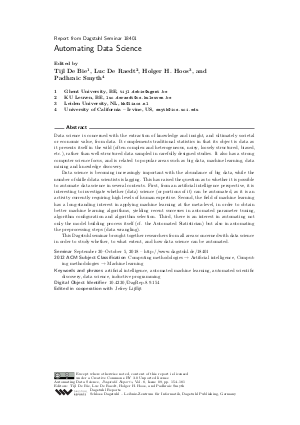Automating Data Science (Dagstuhl Seminar 18401)
Authors Tijl De Bie, Luc De Raedt, Holger H. Hoos, Padhraic Smyth and all authors of the abstracts in this report
-
Part of:
Issue:
Dagstuhl Reports, Volume 8, Issue 9
Part of: Volume: Dagstuhl Reports, Volume 8
Part of: Journal: Dagstuhl Reports (DagRep) - License:
 Creative Commons Attribution 3.0 Unported license
Creative Commons Attribution 3.0 Unported license
- Publication Date: 2019-03-25
File

PDF
DagRep.8.9.154.pdf
- Filesize: 1.82 MB
- 28 pages
Document Identifiers
Subject Classification
Keywords
- artificial intelligence
- automated machine learning
- automated scientific discovery
- data science
- inductive programming
Metrics
- Access Statistics
-
Total Accesses (updated on a weekly basis)
0PDF Downloads0Metadata Views
Abstract
Data science is concerned with the extraction of knowledge and insight, and ultimately societal or economic value, from data. It complements traditional statistics in that its object is data as it presents itself in the wild (often complex and heterogeneous, noisy, loosely structured, biased, etc.), rather than well-structured data sampled in carefully designed studies. It also has a strong computer science focus, and is related to popular areas such as big data, machine learning, data mining and knowledge discovery. Data science is becoming increasingly important with the abundance of big data, while the number of skilled data scientists is lagging. This has raised the question as to whether it is possible to automate data science in several contexts. First, from an artificial intelligence perspective, it is interesting to investigate whether (data) science (or portions of it) can be automated, as it is an activity currently requiring high levels of human expertise. Second, the field of machine learning has a long-standing interest in applying machine learning at the meta-level, in order to obtain better machine learning algorithms, yielding recent successes in automated parameter tuning, algorithm configuration and algorithm selection. Third, there is an interest in automating not only the model building process itself (cf. the Automated Statistician) but also in automating the preprocessing steps (data wrangling). This Dagstuhl seminar brought together researchers from all areas concerned with data science in order to study whether, to what extent, and how data science can be automated.
Cite As Get BibTex
Tijl De Bie, Luc De Raedt, Holger H. Hoos, and Padhraic Smyth. Automating Data Science (Dagstuhl Seminar 18401). In Dagstuhl Reports, Volume 8, Issue 9, pp. 154-181, Schloss Dagstuhl – Leibniz-Zentrum für Informatik (2019)
https://doi.org/10.4230/DagRep.8.9.154
BibTex
@Article{debie_et_al:DagRep.8.9.154,
author = {De Bie, Tijl and De Raedt, Luc and Hoos, Holger H. and Smyth, Padhraic},
title = {{Automating Data Science (Dagstuhl Seminar 18401)}},
pages = {154--181},
journal = {Dagstuhl Reports},
ISSN = {2192-5283},
year = {2019},
volume = {8},
number = {9},
editor = {De Bie, Tijl and De Raedt, Luc and Hoos, Holger H. and Smyth, Padhraic},
publisher = {Schloss Dagstuhl -- Leibniz-Zentrum f{\"u}r Informatik},
address = {Dagstuhl, Germany},
URL = {https://drops.dagstuhl.de/entities/document/10.4230/DagRep.8.9.154},
URN = {urn:nbn:de:0030-drops-103443},
doi = {10.4230/DagRep.8.9.154},
annote = {Keywords: artificial intelligence, automated machine learning, automated scientific discovery, data science, inductive programming}
}
